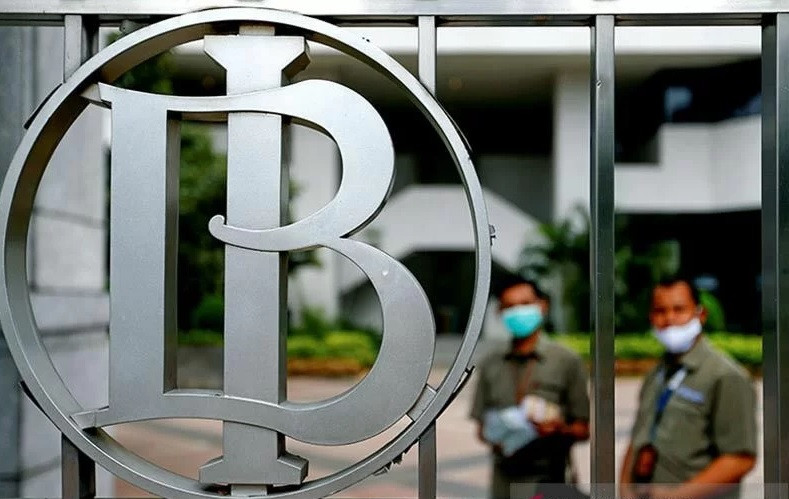Popular Reads
Top Results
Can't find what you're looking for?
View all search resultsPopular Reads
Top Results
Can't find what you're looking for?
View all search resultsPPSK bill: Government seeks to curb House clout on BI, other watchdogs
In the deliberation of the financial sector bill, the government has proposed changes that would ban political party figures from sitting on boards of the central bank and other watchdogs after the draft initiated by lawmakers had raised concerns about the bodies’ independence.
Change text size
Gift Premium Articles
to Anyone
T
he government has proposed to the House of Representatives the reinstatement of a ban on political party figures from running for posts at Bank Indonesia and to undo changes suggested by lawmakers that had raised concerns about political influence on other watchdogs.
The proposal is part of the government’s response to the omnibus bill on financial sector development and strengthening (PPSK) drafted by lawmakers.
Revising Article 47 in the BI Law, the proposal by the government would once again prohibit members or leaders of political parties from sitting on the BI board of governors, according to a document seen by The Jakarta Post, undoing a 2004 revision that had eliminated an earlier ban.
A similar ban would apply to the Deposit Insurance Corporation (LPS), where political party members or leaders would be barred from its board of commissioners.
While the House draft would remove a ban on political party leaders that is currently stipulated in Article 67 of the LPS Law, the government proposal, on the contrary, would extend the ban to regular party members.
The government’s proposal also scraps lawmakers’ plans for the House to seize control of the selection process for leaders of the Financial Services Authority (OJK) and the LPS, so as to keep unchanged current rules that involve both the government and the House in the process.
Finance Ministry Fiscal Policy Agency head Febrio Kacaribu, who leads the deliberation from the government side, neither confirmed nor denied the proposal.
“We are still discussing that,” Febrio told reporters on Nov. 17.
However, Finance Minister Sri Mulyani Indrawati said on Nov. 10 that the government would maintain the credibility and independence of BI and other financial authorities, adding that their independence did not mean they would be less accountable.
“This is a prerequisite [to maintain] stability and trust in our financial system,” Sri Mulyani told reporters after a meeting with House Commission XI, which oversees financial institutions.
The role of the central bank is of significant importance to the financial sector and the economy, as it regulates interest rates and liquidity, which affect the cost of loans, the rate of inflation and the exchange value of the rupiah.
Meanwhile, the OJK sets rules for financial sector actors that affect firms and investors, while the LPS plays a key role in safeguarding customers’ savings and time deposits in the event of a bank’s collapse.
Read also: House, politicians tighten grip on financial sector in new omnibus bill
Doddy Ariefianto, associate head of the Finance Program at Binus University, said upholding financial stability was a critical task that should be conducted by professionals without political interference.
“Any country can sink if they fall into a financial crisis,” Doddy told the Post on Nov. 18.
If political parties were to get a grip on financial authorities, it could draw the finance system into the political cycle, he warned, adding that regulatory boards could then change with the ruling party, which could be perceived as a source of instability by investors.
Analysts at Tenggara Strategics, a think tank affiliated with the Post, said that politicians had an inherent obligation to work in the interest of their parties. Prior to the BI reform of 2004, the central bank was an institution under the government, and monetary policy was a political tool.
Bhima Yudhistira, executive director of the Center of Economic and Law Studies (Celios), said on Monday that Indonesian financial sector institutions had become affiliated with conglomerates in the country, several of which had ties to political parties.
He said it was best to avoid conflicts of interest altogether to prevent financial system risks.
He added that it was best to keep the selection of people in charge of the LPS and OJK in the prevailing regulation, despite it not being free from flaws either.
“If we leave it all to the House, I fear it could [give rise to] transactional [politics]. We can expect that their policies will be less independent, because political parties may steer it from behind,” Bhima told the Post.
Read also: Explainer: Financial system bill heralds changes from crypto to BI
M. Misbakhun, lawmaker from House Commission XI, told reporters on Nov. 17 that he saw no problem in political parties having a role.
“Even the president can come from a political party. Why should it be hard for a politician to be on the BI board of governors? Why do we keep going around in circles on these issues?” he said.
Meanwhile, Vera Febyanthy, a fellow lawmaker from House Commission XI, noted there was no final decision yet regarding BI, the OJK and LPS, adding that the discussion was under way and may change in the course of the deliberation.










